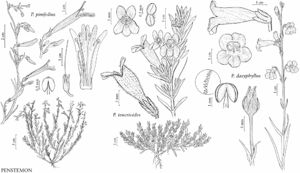Penstemon teucrioides
Pl. Baker. 3: 23. 1901.
Stems prostrate or ascending, 2–10 cm, cinereous, retrorsely hairy, hairs pointed. Leaves not leathery, cinereous, densely retrorsely hairy, hairs pointed; cauline 5–9 pairs, sessile, 4–14 × 0.5–1.4 mm, blade linear, base tapered, apex mucronate, sometimes acuminate. Thyrses continuous, cylindric, 3–15 cm, axis retrorsely hairy to retrorsely cinereous, hairs pointed, verticillasters 1–8, cymes 1 or 2(or 3)-flowered, 1 per node; proximal bracts linear, 6–15 × 0.6–1.5 mm; peduncles and pedicels ascending to erect, retrorsely cinereous, hairs pointed, and, sometimes, sparsely glandular-pubescent. Flowers: calyx lobes lanceolate, (3–)4–6 × 0.7–1 mm, narrowly scarious-margined, retrorsely hairy, hairs pointed, and sparsely glandular-pubescent; corolla blue or violet, lined internally abaxially with reddish violet nectar guides, funnelform, 15–19 mm, sparsely white- or yellowish lanate internally abaxially, tube 6–7 mm, throat gradually inflated, 4–5.5 mm diam., 2-ridged abaxially; stamens: longer pair reaching orifice, filaments glabrous, pollen sacs opposite, navicular to subexplanate, 0.7–1 mm, sutures papillate; staminode 8–9 mm, included or reaching orifice, flattened distally, 0.2–0.3 mm diam., tip straight to recurved, distal 6–7 mm pilose, hairs yellowish orange, to 0.7 mm; style 13–16 mm. Capsules 3.3–4.5 × 2.8–3.6 mm. 2n = 16.
Phenology: Flowering May–Jul(–Aug).
Habitat: Silt or gravelly slopes in sagebrush shrublands.
Elevation: 2200–3400 m.
Discussion
Penstemon teucrioides is known from the Gunnison Basin. Populations have been documented in Chaffee, Gunnison, Hinsdale, Park, and Saguache counties. E. O. Wooton and P. C. Standley (1915) cited a specimen from Tierra Amarilla, Rio Arriba County, New Mexico, which appears to be in error. Penstemon teucrioides is most likely confused with P. crandallii but can be distinguished reliably by its densely retrorsely hairy, cinereous leaves, narrowly scarious-margined calyx lobes, and 0.7–1 mm pollen sacs. Penstemon teucrioides also can be mistaken for P. caespitosus; the two species can be distinguished by the indument of stems and leaves.
Selected References
None.
